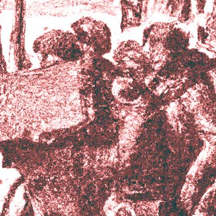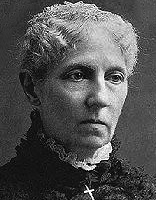| BONFIRE BROADSIDE No. 1 : |
| “On the Return of the Regiment” |


// published in 2023
// price $6/unframed
// poetry / poster |
|
|
 |
| by
Caroline Atherton Mason // a Bonfire Press publication |
|
 
|
American poet Caroline Atherton Mason (1823-90) moved to Fitchburg in North Central Massachusetts in her late 20s, and to this day is one of the most celebrated authors of that city's history.
// To initiate an order, or to arrange for a framed order, please click here to email our staff directly so that we can offer you the minimal shipping charge. |
|

|
“Dear friends, we weave no chapters
fresh and bright /
To bind upon your conquering brows tonight...”
|
|
This poem, forgotten for more than a century, was rediscovered and transcribed by Sally Cragin during archival research at the Fitchburg Historical Society in 2022, and re-introduced to the public at Poets of the Past, a First Thursdays special event hosted by the Stratton Players, the Fitchburg Historical Society, Bonfire Bookshop, and InTown Fitchburg on April 6, 2023.
The broadside design by Zachary Bos uses Bembo and Whitney typefaces, and an illustration created with the assistance of OpenAI software. Published at Bonfire Bookshop in limited numbered series, with 40 copies for distribution and 10 copies out of series. The imprint, Bonfire Press, is a community publishing project funded through donor, grant, and foundation support.
|
Mason was born in Marblehead, Massachusetts, on the coast north of Boston, the daughter of physician Calvin Briggs and Rebecca Briggs. She was educated at Bradford Academy, and began writing when quite young. In 1852, her family moved to Fitchburg, an industrial city on the Nashua River. Her first poems were published in The Salem Register under the pen-name "Caro". Her writing also appeared in The Congregationalist, The Liberal Christian, The Monthly Religious Magazine, The Independent and The Christian Union. She contributed largely to the hymnology of the Unitarian church, and her poetry generally is strong in the didactic element. One of her early poems, "Do They Miss Me at Home?", was set to music by S.M. Grannis and published by mid-1852. It enjoyed widespread popularity in the United States and in England even into the Civil War; the lyrics, written as a homesick girl away from home at school, readily translated to the plight of the soldiers on both sides. |
|
|


